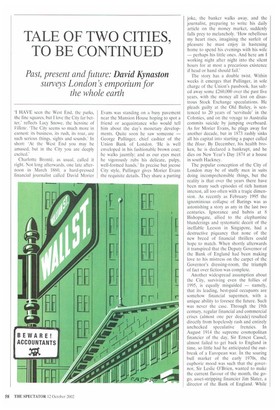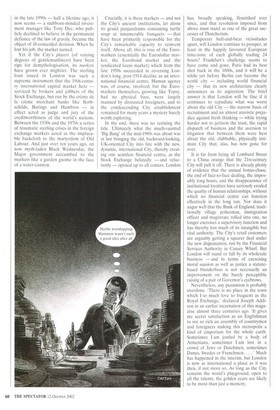TALE OF TWO CITIES, TO BE CONTINUED
Past, present and future: David Kynaston
surveys London's emporium for the whole earth
'I HAVE seen the West End, the parks, the fine squares, but I love the City far better,' reflects Lucy Snowe, the heroine of Villette. 'The City seems so much more in earnest: its business, its rush, its roar, are such serious things, sights and sounds.' In short: 'At the West End you may be amused, but in the City you are deeply excited.'
Charlotte Brontë, as usual, called it right. Not long afterwards, one late afternoon in March 1860, a hard-pressed financial journalist called David Morier Evans was standing on a busy pavement near the Mansion House hoping to spot a friend or acquaintance who would tell him about the day's monetary developments. Quite soon he saw someone — George Pullinger, chief cashier of the Union Bank of London. 'He is well enveloped in his fashionable brown coat; he walks jauntily; and as our eyes meet he vigorously rubs his delicate, pulpy, well-formed hands.' In precise but jocose City style, Pullinger gives Morier Evans the requisite details. They share a parting joke, the banker walks away, and the journalist, preparing to write his daily article on the money market, suddenly falls prey to melancholy. 'How rebellious my heart rises, imagining the surfeit of pleasure he must enjoy in hastening home to spend his evenings with his wife — perhaps his little ones. And here am I working night after night into the silent hours for at most a precarious existence if head or hand should fail.'
The story has a double twist. Within weeks it emerges that Pullinger, in sole charge of the Union's passbook, has salted away some £260,000 over the past five years, with the money all lost on disastrous Stock Exchange speculations. He pleads guilty at the Old Bailey, is sentenced to 20 years of 'servitude' in the Colonies, and on the voyage to Australia commits suicide by jumping overboard. As for Morier Evans, he plugs away for another decade, but in 1873 rashly sinks all his capital into starting a paper called the Hour. By December, his health broken, he is declared a bankrupt, and he dies on New Year's Day 1874 at a house in south Hackney.
The popular conception of the City of London may be of stuffy men in suits doing incomprehensible things, but the reality is that over the years there have been many such episodes of rich human interest, all too often with a tragic dimension. As recently as February 1995 the ignominious collapse of Barings was as astonishing a story as any in the last two centuries. Ignorance and hubris at 8 Bishopsgate, allied to the elephantine blunderings and systematic deceit of the ineffable Leeson in Singapore, had a destructive piquancy that none of the new breed of financial thrillers could hope to match. When shortly afterwards it transpired that the Deputy Governor of the Bank of England had been making love to his mistress on the carpet of the Governor's dressing-room, the triumph of fact over fiction was complete.
Another widespread assumption about the City, surviving even the follies of 1995, is equally misguided — namely, that its leading, best-paid occupants are somehow financial supermen, with a unique ability to foresee the future. Such was never the case. Through the 19th century, regular financial and commercial crises (almost one per decade) resulted directly from hopelessly rash and entirely unchecked speculative frenzies. In August 1914 the supreme cosmopolitan financier of the day, Sir Ernest Cassel, almost failed to get back to England in time, so little had he anticipated the outbreak of a European war. In the soaring bull market of the early 1970s, the euphoric mood was such that the governor, Sir Leslie O'Brien, wanted to make the current flavour of the month, the gogo, asset-stripping financier Jim Slater, a director of the Bank of England. While in the late 1990s — half a lifetime ago, it now seems — a stubborn-minded investment manager like Tony Dye, who publicly declined to believe in the permanent defiance of the law of gravity, became the object of ill-concealed derision. When he lost his job, the market turned.
Yet if the City's players (of varying degrees of gentlemanliness) have been ripe for demythologisation, its markets have grown ever mightier. The sterling loan issued in London was such a supreme instrument that the 19th-century international capital market here — serviced by brokers and jobbers of the Stock Exchange, but run by the creme de la creme merchant banks like Rothschilds, Barings and Hambros — in effect acted as judge and jury of the creditworthiness of the world's nations. Between the 1930s and the 1970s a series of traumatic sterling crises in the foreign exchange markets acted as the implacable backcloth to the martyrdom of Old Labour. And just over ten years ago, on now myth-laden Black Wednesday, the Major government succumbed to the markets like a garden gnome in the face of a water-cannon. Crucially, it is these markets — and not the City's ancient institutions, let alone its grand panjandrums consuming turtle soup at innumerable banquets — that have been primarily responsible for the City's remarkable capacity to reinvent itself. Above all, this is true of the Euromarkets (essentially the Eurodollar market, the Eurobond market and the syndicated loans market) which from the late 1950s succeeded in reversing London's long, post-1914 decline as an international financial centre. Human agency was, of course, involved; but the Euromarkets themselves, growing like Topsy, had no physical base, were largely manned by distrusted foreigners, and to the condescending City establishment remained for many years a mystery barely worth exploring.
In the end, there was no resisting the tide. Ultimately what the much-vaunted 'Big Bang' of the mid-1980s was about was at last bringing the old. backward-looking, UK-oriented City into line with the new, dynamic, international City, thereby creating one seamless financial centre, as the Stock Exchange belatedly — and reluctantly — opened up to all comers. London has, broadly speaking, flourished ever since, and that revolution imposed from above must stand as one of the great successes of Thatcherism.
Temporary bull-and-bear vicissitudes apart, will London continue to prosper, at least in the happily favoured European time-zone of each globally trading 24 hours? Frankfurt's challenge seems to have come and gone, Paris had its best shot back in the 1860s, and it will be a while yet before Berlin can become the world city — including world financial city — that its new architecture clearly announces as its aspiration. The brief answer is that London will be fine if it continues to repudiate what was worst about the old City — the narrow basis of recruitment and an almost atavistic prejudice against fresh thinking — while trying harder not to jettison the trust, the rapid dispatch of business and the aversion to litigation that between them were best about the old, clubbable, physically intimate City that, alas, has now gone for ever.
It is far from being all Lombard Street to a China orange that the 21st-century City will pull it off. There is already plenty of evidence that the annual bonus-chase, the end of face-to-face dealing, the impossibly long hours, and the disappearance of institutional loyalties have seriously eroded the quality of human relationships, without which no financial centre can function effectively in the long run. Nor does it augur well that the Bank of England, traditionally village policeman, immigration officer and magistrate rolled into one, no longer exercises a supervisory function and has thereby lost much of its intangible but vital authority. The City's retail customers are arguably getting a squarer deal under the new dispensation, run by the Financial Services Authority in Canary Wharf. But London will stand or fall by its wholesale business — and in terms of exercising moral suasion as well as justice a statutebased blunderbuss is not necessarily an improvement on the barely perceptible raising of a pair of Governor's eyebrows.
Nevertheless, any pessimism is probably overdone. 'There is no place in the town which I so much love to frequent as the Royal Exchange,' declared Joseph Addison in an earlier incarnation of this magazine almost three centuries ago. It gives me secret satisfaction as an Englishman to see so rich an assembly of countrymen and foreigners making this metropolis a kind of emporium for the whole earth. Sometimes I am jostled by a body of Armenians. sometimes I am lost in a crowd of Jews or Dutchmen, sometimes Danes, Swedes or Frenchmen. . . . Much has happened in the interim, but London is now as international a place as it was then, if not more so. As long as the City remains the world's playground, open to all the talents, the golden years are likely to be more than just a memory.



































































































 Previous page
Previous page